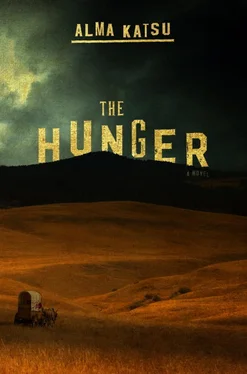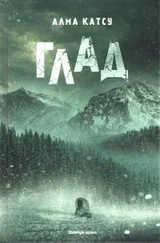Алма Катсу - The Hunger
Здесь есть возможность читать онлайн «Алма Катсу - The Hunger» весь текст электронной книги совершенно бесплатно (целиком полную версию без сокращений). В некоторых случаях можно слушать аудио, скачать через торрент в формате fb2 и присутствует краткое содержание. Город: New York, Год выпуска: 2018, ISBN: 2018, Издательство: G. P. Putnam's Sons, Жанр: Ужасы и Мистика, Историческая проза, на английском языке. Описание произведения, (предисловие) а так же отзывы посетителей доступны на портале библиотеки ЛибКат.
- Название:The Hunger
- Автор:
- Издательство:G. P. Putnam's Sons
- Жанр:
- Год:2018
- Город:New York
- ISBN:978-0-735-21251-0
- Рейтинг книги:4 / 5. Голосов: 1
-
Избранное:Добавить в избранное
- Отзывы:
-
Ваша оценка:
- 80
- 1
- 2
- 3
- 4
- 5
The Hunger: краткое содержание, описание и аннотация
Предлагаем к чтению аннотацию, описание, краткое содержание или предисловие (зависит от того, что написал сам автор книги «The Hunger»). Если вы не нашли необходимую информацию о книге — напишите в комментариях, мы постараемся отыскать её.
The Hunger — читать онлайн бесплатно полную книгу (весь текст) целиком
Ниже представлен текст книги, разбитый по страницам. Система сохранения места последней прочитанной страницы, позволяет с удобством читать онлайн бесплатно книгу «The Hunger», без необходимости каждый раз заново искать на чём Вы остановились. Поставьте закладку, и сможете в любой момент перейти на страницу, на которой закончили чтение.
Интервал:
Закладка:
Reed’s heart jumped in his chest. The boy killed a month ago came to mind, that pale face frozen as though in sleep, the terrible image of a torn-up body. Were the Breen boys sick? Suddenly one and then the other threw their heads down and began to heave violently. The smell was medicinal, overpowering, and unmistakable.
“Hey. You.” Reed crossed the distance between them before they could run away. “You’ve been drinking, haven’t you? Don’t try to deny it. I can smell it on you.”
Both boys—they couldn’t have been older than ten—turned sullen faces toward him. “It’s none of yer business,” said one.
The smell of vomit and whiskey was so foul that Reed resisted the urge to hold his handkerchief over his nose. He doubted the boys had gotten the liquor from their father: Patrick Breen would whip them to within an inch of their lives. “You stole the whiskey you drank away, didn’t you? Who did you steal it from? Out with it.”
They glowered at Reed. “We ain’t telling,” the scrawnier, dirtier one said.
Reed was tempted to give them the back of his hand but thought the better of it. People had started to stare.
“Why you bothering them kids?” Milt Elliott, a teamster for the Donners, shook his head.
“It’s none of your nevermind,” Reed said.
“You ain’t the boys’ father.” This from another of the Donners’ men, Samuel Shoemaker.
“Their father’s probably lying facedown in a ditch himself.” The words came out before Reed could stop himself. He cursed his sharp tongue. He could imagine how he must sound to this crowd, many of them hungover themselves from dancing half the night away. His palms started to tingle. He could feel dirt gathering in his eardrums, in his nostrils, beneath his fingernails. He needed to bathe. “Look, I’m only trying to find out where the boys got the alcohol.”
“Are you saying it’s our fault the boys got themselves drunk?” Elliott said, raising an eyebrow.
“No. I’m just saying that we must do a better job keeping track of all our supplies.” He shook his head. He would try again. “We might want to lock up our spirits, for example—”
Tall and angular, always hovering like an ominous scarecrow, Lewis Keseberg pushed his way through the crowd. Reed could’ve predicted it; Keseberg always seemed to be spoiling for a fight. “You’d like to take our liquor away, wouldn’t you? You’d probably chuck it in the Little Sandy when nobody was looking, every drop of it.” He jabbed a finger into Reed’s chest. “If you try to lay so much as one finger on any of my bottles, so help me God—”
Sweat began to collect on Reed’s upper lip. He glanced around but didn’t see Keseberg’s wife or child anywhere. Seemed Keseberg kept anything humane about him behind closed doors, and there’d be no plying him with reminders of family and decency. Still, Reed couldn’t let Keseberg push him around in front of all these other people; they’d decide he was a coward. But Keseberg was notoriously unforgiving. No one gambled with him anymore, because he never forgot who cheated, who liked to bluff, and who always held pat. Remembered which cards in the deck had already been played, calculated which were likely to come up. He apparently had a memory as sharp as a blade. He was also a half foot taller and thirty pounds heavier.
He was standing so close that Reed was sure Keseberg would notice that he was not right .
Reed imagined that his own secret—the badness in him—was so strong that it could be seen or smelt if you got close enough. It was like the fine trail dust he could never quite be rid of, traces of his sins on his hands or his face, seeping up from under his clothes, no matter how hard he tried to wipe it away.
He reached for his handkerchief again.
“Keep your hands off me,” he said, hoping his voice wouldn’t shake. “Or—”
“Or what?” Keseberg only leaned closer. Sharp as a blade.
Before Reed could answer, a huge slab of a man stepped between them: John Snyder, Franklin Graves’s hired driver. Probably the last person any reasonable man would want to tangle with.
Snyder narrowed his eyes but there was a playfulness in his smirk. “What’s going on here? This little man trying to tell everyone what to do—again?” Snyder liked to call him little man , a reminder that he could push Reed around whenever he felt like it. “I thought they told you last night that you’re not going to boss us around.”
Snyder turned back to him and Reed thought he had a knowing sort of look in his eye. Reed’s blood ran cold. Had anyone else seen Snyder’s face?
But the others carried on; no one had seen. No one could know. “That’s right. George Donner’s captain, not you,” Keseberg said.
“I’m only speaking common sense,” Reed insisted. This was important. Despite his discomfort, he would try one more time to make them listen. “Fort Laramie was the last outpost before California. From here out there are no more general stores, no grain depots, no settlers willing to sell a sack of cornmeal. Whoever lost their whiskey to these boys”—Reed pointed a finger at the pair, still flat on their backs in the dirt—“will wish they had been more careful a couple weeks down the road when there’s not a drop to be had.”
The crowd quieted. Reed sensed a small victory.
“Friends,” he continued, “by all accounts, the easy part of the journey is behind us. At Fort Laramie I spoke to men who have been down this cutoff. They say that the road ahead is more daunting than anything we’ve imagined. I urge you to take this time to make some difficult choices.” They were hushed now, waiting restlessly for him to speak. Even Snyder was watching him, his eyes nearly golden in the sun. “Many of us are burdened with possessions, hauling things from home that we thought we couldn’t bear to part with. I urge you to shed them now . Leave them here in this meadow, otherwise you will kill your oxen on the mountains ahead.”
The crowd was silent. He saw too late that he’d overplayed his hand, even though they knew—they must know—that he spoke the truth. For miles, they’d been passing the possessions of other pioneers abandoned trailside. Furniture, trunks of clothing, children’s toys, even a piano sitting in an open field as though waiting for someone to step up and play a tune on it. He had watched young Doris Wolfinger, the German girl, finger the stiff white keys wistfully, and the sight had brought a deep ache into his chest, one he couldn’t quite name.
But like many truths, no one wanted to hear it.
“Look who’s talking,” Keseberg said. “You and that special wagon you got. Takes four oxen to pull it and that’s over even terrain.”
“You sure don’t practice what you preach, do you?” Snyder asked, almost casually, picking over his filthy fingernails, not even looking at Reed. Still, Reed couldn’t help but notice how large and powerful Snyder’s hands were. Couldn’t help but wonder how they might feel tightened around Reed’s own throat. “We don’t need some hypocrite to tell us how to behave.”
Before Reed could speak, George Donner came through the crowd, leading his horse by the reins.
“We’re burning daylight, neighbors. Let’s get on with our business, chain up and move out. I want those wagons rolling in a quarter of an hour.”
The crowd dispersed as Donner swung into the saddle. He looked pleased with himself, Reed thought. He supposed he should be grateful to Donner for his intercession but he couldn’t bring himself to feel anything but resentment, even as the dark thoughts of John Snyder—that hard-looking jaw, those powerful, terrifying hands—began to subside.
Читать дальшеИнтервал:
Закладка:
Похожие книги на «The Hunger»
Представляем Вашему вниманию похожие книги на «The Hunger» списком для выбора. Мы отобрали схожую по названию и смыслу литературу в надежде предоставить читателям больше вариантов отыскать новые, интересные, ещё непрочитанные произведения.
Обсуждение, отзывы о книге «The Hunger» и просто собственные мнения читателей. Оставьте ваши комментарии, напишите, что Вы думаете о произведении, его смысле или главных героях. Укажите что конкретно понравилось, а что нет, и почему Вы так считаете.







![Алма Катсу - Голод [litres]](/books/432580/alma-katsu-golod-litres-thumb.webp)




